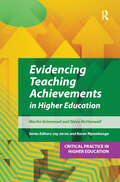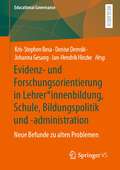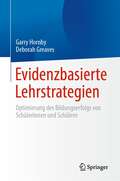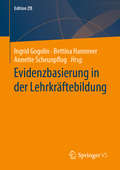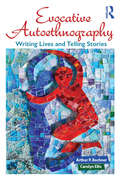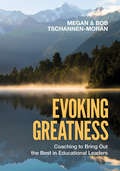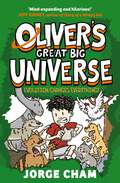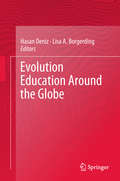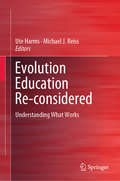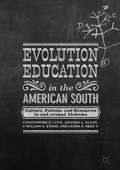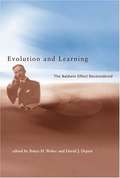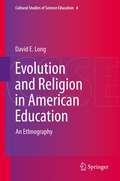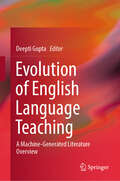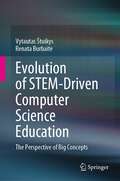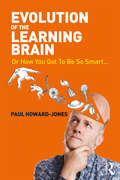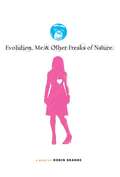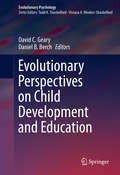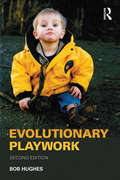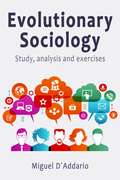- Table View
- List View
Evidencing Teaching Achievements in Higher Education (Critical Practice in Higher Education)
by Marita Grimwood Steve McHanwellThis book demonstrates how university lecturers can document their impactful teaching and evidence their teaching achievements in the contemporary HE landscape.It is an essential read for all lecturers who might need to evidence their achievements for academic development including job promotions and Advance HE fellowship. It includes: the kinds of evidence that might be sought analysis and evaluation of the different forms of evidence available and how individuals can develop a narrative of teaching impact It also provides institutions with a framework they can use to support staff in collecting and developing qualitative and quantitative evidence for teaching achievements.Acknowledging the ever-increasing complexity of the teaching role within higher education, the book provides valuable support for individuals wishing to showcase their teaching and institutions looking to recognise and reward academic and professional staff.Part of the Critical Practice in Higher Education series
Evidenz- und Forschungsorientierung in Lehrer*innenbildung, Schule, Bildungspolitik und -administration: Neue Befunde zu alten Problemen (Educational Governance #55)
by Denise Demski Jan-Hendrik Hinzke Kris-Stephen Besa Johanna GesangMit Blick auf eine Evidenz- bzw. Forschungsorientierung vereint der Sammelband Überblicksbeiträge, empirische Studien sowie Beispiele guter Praxis auf den Ebenen Lehrer*innenbildung, Schulpraxis sowie Bildungspolitik und Bildungsadministration. Dabei werden nicht nur die jeweiligen Programmatiken hinter den Ansprüchen einer universitären Forschungsorientierung, eines datengestützten schulischen Handelns sowie einer evidenzbasierten Steuerung des Bildungssystems kritisch beleuchtet, sondern auch mögliche Ursachen einer geringen Evidenzorientierung auf den drei Ebenen identifiziert.Kapitel 10 ist unter einer Creative Commons Attribution 4.0 International License über link.springer.com frei verfügbar (Open Access).
Evidenzbasierte Lehrstrategien: Optimierung des Bildungserfolgs von Schülerinnen und Schülern
by Garry Hornby Deborah GreavesDieses Buch befasst sich mit evidenzbasierten Praktiken, die einen effektiven Unterricht ermöglichen, um einen optimalen Bildungserfolg für Schüler zu gewährleisten. Es identifiziert Schlüsselstrategien, die auf umfangreichen Forschungsergebnissen basieren, welche ihre Wirksamkeit bei der Verbesserung der Schülerergebnisse bestätigen. Das Buch bietet Lehrkräften einen Leitfaden zur Unterscheidung zwischen Strategien, die evidenzbasiert sind, und solchen, für die es nur wenige oder gar keine Belege gibt. Es beschreibt gängige Unterrichtsstrategien, die häufig in Schulen eingesetzt werden, obwohl ihre Wirksamkeit kaum belegt ist. Darüber hinaus werden in dem Buch acht wichtige evidenzbasierte Unterrichtspraktiken genannt, die von den Lehrkräften direkt umgesetzt werden können, die theoretischen und forschungsbasierten Grundlagen für jede dieser Strategien erläutert, und es werden Leitlinien für Sonder- und allgemeinbildende Lehrkräfte gegeben, wie sie diese Strategien am effektivsten anwenden können, mit Links zu Videobeispielen für ihre Anwendung im Unterricht. Der Text untersucht auch häufige Hindernisse für den Einsatz evidenzbasierter Praktiken in Schulen. Es werden die Auswirkungen auf die Lehrerausbildung untersucht, wobei der Schwerpunkt auf der Ausbildung von Pädagogen liegt, damit sie evidenzbasierte Strategien erkennen und effektiv umsetzen können, wobei diejenigen vermieden werden, die nicht evidenzbasiert sind, selbst wenn sie in den Schulen beliebt sind. „Evidenzbasierte Lehrstrategien“ ist ein unverzichtbares Nachschlagewerk für Forscher, Fachleute und Studenten der pädagogischen Psychologie, der Kinder- und Schulpsychologie und der Sozialarbeit, die daran interessiert sind, wirksame Lehrmethoden kennenzulernen und umzusetzen, die das Engagement der Schüler und ihre schulischen Leistungen verbessern, das sozial-emotionale Lernen stärken und die Schulabbrecherquote senken.
Evidenzbasierung in der Lehrkräftebildung (Edition ZfE #4)
by Ingrid Gogolin Bettina Hannover Annette ScheunpflugDas Buch nähert sich dem Thema ‚Datengestützte Lernformate‘ im Kontext der Ausbildung von Lehrerinnen und Lehrern aus einer bilanzierenden Perspektive. Vorgestellt und zusammengefasst werden Rahmenbedingungen, theoretische Begründungen und Zielsetzungen des Reformansatzes. Erfahrungsberichte zur praktischen Umsetzung und der empirischen Überprüfung des innovativen Lernformats ergänzen die Darstellung.
Evocative Autoethnography: Writing Lives and Telling Stories (Writing Lives: Ethnographic and Autoethnographic Narratives)
by Arthur Bochner Carolyn EllisThis comprehensive text is the first to introduce evocative autoethnography as a methodology and a way of life in the human sciences. Using numerous examples from their work and others, world-renowned scholars Arthur Bochner and Carolyn Ellis, originators of the method, emphasize how to connect intellectually and emotionally to the lives of readers throughout the challenging process of representing lived experiences. Written as the story of a fictional workshop, based on many similar sessions led by the authors, it incorporates group discussions, common questions, and workshop handouts. The book: describes the history, development, and purposes of evocative storytelling; provides detailed instruction on becoming a story-writer and living a writing life; examines fundamental ethical issues, dilemmas, and responsibilities;illustrates ways ethnography intersects with autoethnography; calls attention to how truth and memory figure into the works and lives of evocative autoethnographers.
Evocative Coaching: Transforming Schools One Conversation at a Time
by Megan Tschannen-Moran Robert K. Tschannen-MoranCultivate emotional intelligence and eliminate barriers to coaching success Challenging times demand we change how we teach, and research shows that coaching is the best way to bring about robust change in instructional practice. The second edition of Evocative Coaching helps skillful coaches develop trust and unearth the values and fears that both motivate and block teachers from achieving all that they hope. Using the LEAD (listen, emphasize, appreciate, and design) process, Evocative Coaches take a partnership role, ask questions, and co-create designs. This person-centered, no-fault, strengths-based model is grounded in adult learning theory and positive psychology and emphasizes the emotional intelligence needed to establish trust. The hands-on guide for coaching practitioners works with other coaching models and · is grounded in extensive research · includes real-life vignettes and sample dialogues that bring important principles to life · provides tools designed to invite reflection and help coaches continuously improve With evocative coaching, educators can rise to new heights of ambition and ability and discover new solutions to the complex challenges they face.
Evocative Coaching: Transforming Schools One Conversation at a Time
by Megan Tschannen-Moran Robert K. Tschannen-MoranCultivate emotional intelligence and eliminate barriers to coaching success Challenging times demand we change how we teach, and research shows that coaching is the best way to bring about robust change in instructional practice. The second edition of Evocative Coaching helps skillful coaches develop trust and unearth the values and fears that both motivate and block teachers from achieving all that they hope. Using the LEAD (listen, emphasize, appreciate, and design) process, Evocative Coaches take a partnership role, ask questions, and co-create designs. This person-centered, no-fault, strengths-based model is grounded in adult learning theory and positive psychology and emphasizes the emotional intelligence needed to establish trust. The hands-on guide for coaching practitioners works with other coaching models and · is grounded in extensive research · includes real-life vignettes and sample dialogues that bring important principles to life · provides tools designed to invite reflection and help coaches continuously improve With evocative coaching, educators can rise to new heights of ambition and ability and discover new solutions to the complex challenges they face.
Evocazioni: Tipici sortilegi statunitensi hoodoo dal 1800 al 1920
by Talia FelixUn vero resoconto della magia statunitense hoodoo e voodoo come veniva praticata in passato. L'arte magica dell'hoodoo é stata incompresa per tutta la sua esistenza. Tramite questo prezioso trattato storico sarete in grado di osservare lo stile genuino degli incantesimi usati dai praticanti del passato, inclusi sortilegi del Doctor Buzzard, di Marie Laveau, Zora Neale Hurston ed altri. Questa nuova edizione è organizzata in maniera conveniente in base allo scopo dell'incantesimo per facilitarne la consultazione. Magie per: SACCHETTI MAGICI, HAND, MOJO & GRIS-GRIS - BOTTIGLIE E FIASCHI - SIGILLI E SCRITTURE SACRE - DANZE - INCANTESIMI D'AMORE - FEDELTA' - MATRIMONIO - SORTILEGI PER RIMUOVERE RIVALI IN AMORE - PER FAR TORNARE AMANTI PERDUTI - INCANTESIMI PECUNIARI - PER VINCERE AL GIOCO - PER AVERE SUCCESSO NEGLI AFFARI - PER OTTENERE UN LAVORO - PER VINCERE UN PROCESSO - PER SFUGGIRE A GUAI LEGALI - USCIRE DI PRIGIONE - EVITARE L'ARRESTO - OTTENERE GIUSTIZIA - MALEDIZIONI, INCANTESIMI PER ARRECARE DANNO E MORTE - BAMBOLINE VOODOO - PROTEZIONE E RIMOZIONE DI MALEDIZIONI - RIMOZIONE DI STREGONERIE E SORTILEGI. Più di 160 incantesimi!
Evoking Greatness: Coaching to Bring Out the Best in Educational Leaders
by Megan Tschannen-Moran Robert K. Tschannen-MoranDiscover coaching strategies to inspire greatness in any educational leader! Centered on evocative coaching, a person-centered, no-fault, strengths-based coaching model, this book will equip those who coach educational leaders to host engaging and productive coaching conversations. Coaches who read this book will learn to LEAD: Listen, Empathize, Appreciate, and Design, as well as to discover: Guidance for coaching leaders with specific questions, things to listen for, and ways to generate new ideas and motivation Research-based theories that ground the strategies presented in each chapter Real-life vignettes that illustrate the evocative coaching model in action Reflection and discussion questions, templates, and other materials to scaffold the learning of coaches as they innovate their way forward "Leadership coaching has arisen as a powerful intervention to support the professional learning of leaders. In this book Megan and Bob Tschannen-Moran invite us to see into their world of evocative coaching. They demonstrate how coaching conversations can lead to a flow of energy, enthusiasm and possibilities that bring out movement in people. The authors combine their theoretical knowledge with their experience as coaches, exemplified in wonderful stories and practical examples. As a coach myself I could not stop reading because I was so curious about the next chapter. The book is a great example of how high quality professional learning can enhance educational leaders′ daily leadership practice." —Marit Aas, Associate Professor University of Oslo, Oslo, Norway
Evoking Greatness: Coaching to Bring Out the Best in Educational Leaders
by Megan Tschannen-Moran Robert K. Tschannen-MoranDiscover coaching strategies to inspire greatness in any educational leader! Centered on evocative coaching, a person-centered, no-fault, strengths-based coaching model, this book will equip those who coach educational leaders to host engaging and productive coaching conversations. Coaches who read this book will learn to LEAD: Listen, Empathize, Appreciate, and Design, as well as to discover: Guidance for coaching leaders with specific questions, things to listen for, and ways to generate new ideas and motivation Research-based theories that ground the strategies presented in each chapter Real-life vignettes that illustrate the evocative coaching model in action Reflection and discussion questions, templates, and other materials to scaffold the learning of coaches as they innovate their way forward "Leadership coaching has arisen as a powerful intervention to support the professional learning of leaders. In this book Megan and Bob Tschannen-Moran invite us to see into their world of evocative coaching. They demonstrate how coaching conversations can lead to a flow of energy, enthusiasm and possibilities that bring out movement in people. The authors combine their theoretical knowledge with their experience as coaches, exemplified in wonderful stories and practical examples. As a coach myself I could not stop reading because I was so curious about the next chapter. The book is a great example of how high quality professional learning can enhance educational leaders′ daily leadership practice." —Marit Aas, Associate Professor University of Oslo, Oslo, Norway
Evolution Changes Everything! (Oliver's Great Big Universe)
by Jorge Cham&‘Mind-expanding and hilarious!&’ Jeff Kinney, author of the bestselling DIARY OF A WIMPY KID series.The third book in the hilarious series that makes you laugh-out-loud AND grows your brain. Perfect for readers age 8+ and fans of Diary of a Wimpy Kid and The 13-Storey Treehouse. Hi, I&’m Oliver! My next book is about something everyone loves – animals! It has to be the best one yet if I&’m going sell enough copies to finally buy a computer than doesn&’t majorly lag. Of course I still have to deal with all the usual stuff: neighbourhood chores, gaming problems, and a disastrous friendship group break-up. But all this thinking about how animals evolved has got me wondering about where we came from, and all things about: how scum and bacteria are the origins of life Mass extinctions and what happened to the dinosaurs Fish, dogs, horses, chickens. And oh yes, people! From bestselling writer and robotics engineer Jorge Cham, Oliver&’s Great Big Universe: Evolution Changes Everything! is the third book in a STEM-themed, diary-style series.
Evolution Education Around the Globe
by Hasan Deniz Lisa A. BorgerdingThis edited book provides a global view on evolution education. It describes the state of evolution education in different countries that are representative of geographical regions around the globe such as Eastern Europe, Western Europe, North Africa, South Africa, North America, South America,Middle East, Far East, South East Asia, Australia, and New Zealand.Studies in evolution education literature can be divided into three main categories: (a) understanding the interrelationships among cognitive, affective, epistemological, and religious factors that are related to peoples’ views about evolution, (b) designing, implementing, evaluating evolution education curriculum that reflects contemporary evolution understanding, and (c) reducing antievolutionary attitudes. This volume systematically summarizes the evolution education literature across these three categories for each country or geographical region. The individual chapters thus include common elements that facilitate a cross-cultural meta-analysis. Written for a primarily academic audience, this book provides a much-needed common background for future evolution education research across the globe.
Evolution Education Re-considered: Understanding What Works
by Michael J. Reiss Ute HarmsThis collection presents research-based interventions using existing knowledge to produce new pedagogies to teach evolution to learners more successfully, whether in schools or elsewhere. ‘Success’ here is measured as cognitive gains, as acceptance of evolution or an increased desire to continue to learn about it. Aside from introductory and concluding chapters by the editors, each chapter consists of a research-based intervention intended to enable evolution to be taught successfully; all these interventions have been researched and evaluated by the chapters’ authors and the findings are presented along with discussions of the implications. The result is an important compendium of studies from around the word conducted both inside and outside of school. The volume is unique and provides an essential reference point and platform for future work for the foreseeable future.
Evolution Education in the American South
by Christopher D. Lynn Amanda L. Glaze William A. Evans Laura K. ReedThis volume reaches beyond the controversy surrounding the teaching and learning of evolution in the United States, specifically in regard to the culture, politics, and beliefs found in the Southeast. The editors argue that despite a deep history of conflict in the region surrounding evolution, there is a wealth of evolution research taking place--from biodiversity in species to cultural evolution and human development. In fact, scientists, educators, and researchers from around the United States have found their niche in the South, where biodiversity is high, culture runs deep, and the pace is just a little bit slower.
Evolution and Learning: The Baldwin Effect Reconsidered
by Bruce H. Weber David J. DepewThe role of genetic inheritance dominates current evolutionary theory. At the end of the nineteenth century, however, several evolutionary theorists independently speculated that learned behaviors could also affect the direction and rate of evolutionary change. This notion was called the Baldwin effect, after the psychologist James Mark Baldwin. In recent years, philosophers and theorists of a variety of ontological and epistemological backgrounds have begun to employ the Baldwin effect in their accounts of the evolutionary emergence of mind and of how mind, through behavior, might affect evolution. The essays in this book discuss the originally proposed Baldwin effect, how it was modified over time, and its possible contribution to contemporary empirical and theoretical evolutionary studies. The topics include the effect of the modern evolutionary synthesis on the notion of the Baldwin effect, the nature and role of niche construction in contemporary evolutionary theory, the Baldwin effect in the context of developmental systems theory, the possible role of the Baldwin effect in computational cognitive science biosemiotics, and the emergence of consciousness and language.
Evolution and Religion in American Education
by David E. LongEvolution and Religion in American Education shines a light into one of America's dark educational corners, exposing the regressive pedagogy that can invade science classrooms when school boards and state overseers take their eyes off the ball. It sets out to examine the development of college students' attitudes towards biological evolution through their lives. The fascinating insights provided by interviewing students about their world views adds up to a compelling case for additional scrutiny of the way young people's educational experiences unfold as they consider--and indeed in some cases reject--one of science's strongest and most cogent theoretical constructs. Inevitably, open discussion and consideration of the theory of evolution can chip away at the mental framework constructed by Creationists, eroding the foundations of their faith. The conceptual battleground is so fraught with logical challenges to Creationist dogma that in a number of cases students' exposure to such dangerous ideas is actively prevented. This book provides a detailed map of this astonishing struggle in today's America--a struggle many had thought was done and dusted with the onset of the Enlightenment.
Evolution of English Language Teaching: A Machine-Generated Literature Overview
by Deepti GuptaThis book offers a machine-generated literature survey review of the vibrant history and multifaceted dimensions of English Language Teaching (ELT). It discusses its remarkable evolution and its profound impact across various fields. Its impact extends beyond education: influencing psychology, developmental studies, communication strategies for leaders and language proficiency assessment for migrants and job seekers. Each chapter is organized by the book editor along a chronological progression and begins with a human-written introduction. Each chapter chronicles a stage in ELT's growth, using publication dates as reference points and provides summaries of selected publications, offering readers the freedom to explore the various aspects of ELT. This reader-friendly volume accommodates diverse readers, including students, educators, researchers, policymakers and anyone intrigued by the intricate tapestry of English Language Teaching. It's a comprehensive journey through the evolution of ELT, reflecting its synchronous and diachronic dimensions, all within a single, accessible volume. The auto-summaries have been generated by a recursive clustering algorithm via the Dimensions Auto-summarizer by Digital Science. The editors of this book selected which Springer Nature content should be auto-summarized and decided its order of appearance. Please be aware that these are extractive auto-summaries, which consist of original sentences, but are not representative of the original paper, since we do not show the full length of the publication. Please note that only published SN content is represented here and that machine-generated books are still at an experimental stage.
Evolution of STEM-Driven Computer Science Education: The Perspective of Big Concepts
by Vytautas Štuikys Renata BurbaitėThe book discusses the evolution of STEM-driven Computer Science (CS) Education based on three categories of Big Concepts, Smart Education (Pedagogy), Technology (tools and adequate processes) and Content that relates to IoT, Data Science and AI. For developing, designing, testing, delivering and assessing learning outcomes for K-12 students (9-12 classes), the multi-dimensional modelling methodology is at the centre. The methodology covers conceptual and feature-based modelling, prototyping, and virtual and physical modelling at the implementation and usage level. Chapters contain case studies to assist understanding and learning. The book contains multiple methodological and scientific innovations including models, frameworks and approaches to drive STEM-driven CS education evolution.Educational strategists, educators, and researchers will find valuable material in this book to help them improve STEM-driven CS education strategies, curriculum development, and new ideas for research.
Evolution of the Learning Brain: Or How You Got To Be So Smart...
by Paul Howard-JonesHow does learning transform us biologically? What learning processes do we share with bacteria, jellyfish and monkeys? Is technology impacting on our evolution and what might the future hold for the learning brain? These are just some of the questions Paul Howard-Jones explores on a fascinating journey through 3.5 billion years of brain evolution, and discovers what it all means for how we learn today. Along the way, we discover how the E. coli in our stomachs learn to find food why a little nap can help bees find their way home the many ways that action, emotion and social interaction have shaped our ability to learn the central role of learning in our rise to top predator. An accessible writing style and numerous illustrations make Evolution of the Learning Brain an enthralling combination of biology, neuroscience and educational insight. Howard-Jones provides a fresh perspective on the nature of human learning that is exhaustively researched, exploring the implications of our most distant past for twenty-first-century education.
Evolution, Creationism, and the Battle to Control America'S Classrooms
by Michael Berkman Eric PlutzerWho should decide what children are taught in school? This question lies at the heart of the evolution-creation wars that have become a regular feature of the U. S. political landscape. Ever since the 1925 Scopes 'monkey trial' many have argued that the people should decide by majority rule and through political institutions; others variously point to the federal courts, educational experts, or scientists as the ideal arbiter. Berkman and Plutzer illuminate who really controls the nation's classrooms. Based on their innovative survey of 926 high school biology teachers they show that the real power lies with individual educators who make critical decisions in their own classrooms. Broad teacher discretion sometimes leads to excellent instruction in evolution. But the authors also find evidence of strong creationist tendencies in America's public high schools. More generally, they find evidence of a systematic undermining of science and the scientific method in many classrooms.
Evolution, Me & Other Freaks of Nature
by Robin BrandeYour best friend hates you. The guy you liked hates you. Your entire group of friends hates you.All because you did the right thing.Welcome to life for Mena, whose year is starting off in the worst way possible. She's been kicked out of her church group and no one will talk to her--not even her own parents. No one except for Casey, her supersmart lab partner in science class, who's pretty funny for the most brilliant guy on earth.And when Ms. Shepherd begins the unit on evolution, school becomes more dramatic than Mena could ever imagine . . . and her own life is about to evolve in some amazing and unexpected ways.From the Hardcover edition.
Evolution, Me and Other Freaks of Nature
by Robin BrandeFollowing her conscience led high school freshman Mena to clash with her parents and former friends from their conservative Christian church, but might result in new friendships and more when she stands up for a teacher who refuses to include "Intelligent Design" in lessons on evolution.
Evolutionary Perspectives on Child Development and Education
by David C. Geary Daniel B. BerchThis stimulating volume assembles leading scholars to address issuesin children's cognitive, academic, and social development through the lens ofevolutionary psychology. Debates and controversies in the field highlight thepotential value of this understanding, from basic early learning skills throughemerging social relationships in adolescence, with implications for academicoutcomes, curriculum development, and education policy. Children's evolvedtendency toward play and exploration fuels an extended discussion on child-versus adult-directed learning, evolutionary bases are examined for younglearners' moral development, and contemporary theories of learning and memoryare viewed from an evolutionary perspective. Alongthe way, contributors' recommendations illustrate real-world uses of evolution-basedlearning interventions during key developmental years. Among the topics covered: The adaptive value of cognitive immaturity:applications of evolutionary developmental psychology to early education Guidedplay: a solution to the play versus learning dichotomy Adolescent bullying in schools: anevolutionary perspective Fairness:what it isn't, what it is, and what it might be for Adaptingevolution education to a warming climate of teaching and learning The effects of an evolution-informed school environmenton student performance and wellbeing Evolutionary Perspectives on Child Development andEducation will interest researchers andgraduate students working in diverse areas such as evolutionary psychology,cultural anthropology, human ecology, developmental psychology, and educationalpsychology. Researchers in applied developmental science and early educationwill also find it useful.
Evolutionary Playwork
by Bob HughesPlay is a crucial component in the development of all children. In this fully updated and revised edition of his classic playwork text, Bob Hughes explores the complexities of children’s play, its meaning and purpose, and argues that adult-free play is essential for the psychological well-being of the child. The book is divided into fourteen chapters that together examine the fundamentals of evolutionary play. Firstly, Hughes examines the very earliest ideas of playwork and its impact on brain growth and organization today. He then goes on to explore and explain the key theoretical concepts underlying playwork. These include discussions on free play and creating suitable play environments alongside more thorny issues such as safety and consultation. Finally, the book offers up some of Hughes’ most recent research that reveals how his approach to play and playwork in global society has continued to evolve throughout his career to meet new challenges and needs. Throughout this book, Hughes has included his fellow practitioner Mick Conway’s vivid observations of children at play to bring the facts and arguments in the text to life. This revised edition reflects important recent advances in our understanding of the evolutionary history of play and its impact on the development of the brain, of the role play in the development of resilience and of the impact of play deprivation. Evolutionary Playwork is still the only book to combine the reality of playwork practice with the fundamentals of evolutionary and developmental psychology, and it is still essential reading for all playwork students, practitioners and researchers.
Evolutionary Sociology
by Miguel D'AddarioThe most basic idea that underlies the concept of structure is that reality is not chaos. The skeleton of a living being is its bony system. The structure of a building is given in the way beams, floors, spaces, etc. are arranged. One of the most important influences in shaping the concept of structure in the sociology comes from Marxist thought in which there has been a sharper structural image of society.
